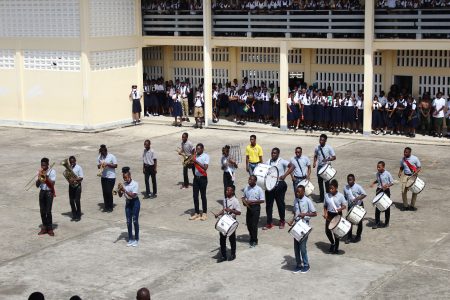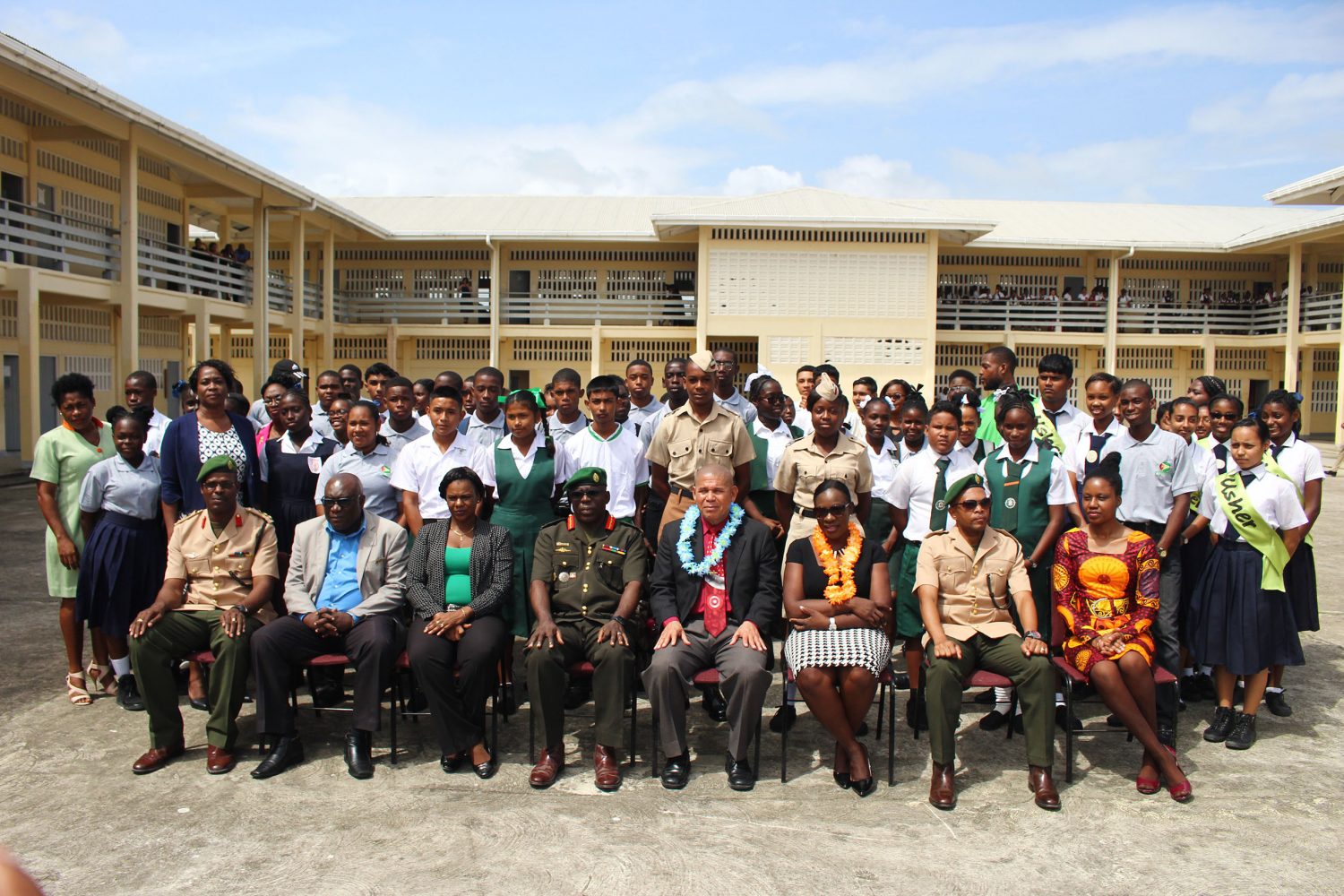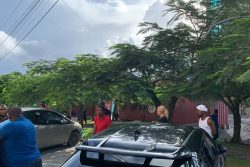The National Cadet Corps Programme (NCCP), established with the aim of building character and developing life skills among the nation’s youth, was officially relaunched yesterday.
The programme, which targets high school-aged children, is a collaborative effort between the Ministry of Social Cohesion, through the Department of Culture, Youth and Sport, the Ministry of Education and the Guyana Defence Force (GDF).
According to Major Eon Murray, Training Officer of the Guyana People’s Militia, which is the executing body of the programme, the Cadet Corps is intended to create well-rounded individuals, through learning that will complement the formal school curriculum, in the form of both academic and adventure training.

Murray gave remarks during the launch, which was held at the Hope Secondary School yesterday morning.
“We foresee you, taken as you are with your raw talent, energy and intellect being transformed into morally sound, well-trained, disciplined, skilled and responsible men and women…This Cadet Corps is an additional programme that will enable you to achieve much more than I did. After being molded through this programme, I look forward to seeing the leaders that you will become. You will uphold the concepts of duty and service. And you will hold high levels of responsibility. This is the secure future, as the motto says, I envisage,” Dr Nichole Nedd-Jerrick, the event’s guest speaker, told the students present. Nedd-Jerrick is the senior medical registrar at the Enmore Polyclinic.
The Cadet Corps pilot programme will run for one year and is being executed across six schools—the Stewartville Secondary School in Region Three; North Ruimveldt Multilateral School and Hope Secondary School in Region Four; Berbice High School, in Region Six; St Ignatius Secondary School in Region Nine; and the Mackenzie High School in Region Ten.
The programme will be rolled out to other schools as it progresses.
Minister of Education Nicolette Henry, during her address at the event, extended congratulations to all stakeholders on the launch of the Cadet Corps, which she stated will “assist in preparing our young people for future service” and “provide basic military training that should inculcate the feeling of camaraderie, courage, service and above all, patriotism.”
“No matter what field our cadets will choose to provide service, it is important to have capacity and character…Pro-grammes such as this cadet corps, I have no doubt will assist our young people to better understand their roles as the nation builders of Guyana and I look forward to fruitful and beneficial partnership between the Ministry of Education and the Guyana Defence Force,” she said.
The programme, according to Chief-of-Staff of the GDF Brigadier Patrick West, is being administered by the Guyana People’s Militia, which was reestablished in 2015, and has representation across several regions, which include regions Three, Four, Five, Six, Nine and Ten, from where cadets were present yesterday.
So far, 487 students have already been registered for the NCCP and students began training this week, cadets indicated yesterday.
The subject areas being explored are: Guyanese History and Culture; Mentor-ship and Counselling; Coordination and Dexterity; Navigation Skills; Environ-mental Awareness; First Aid; Leadership Studies; Communication Skills; Physical Training; Technical Training; Spanish; Portuguese; English; and Mathematics.
Students will also embark on expeditions and adventure training and exchange programmes between target schools.
Minister of Social Cohesion Dr George Norton, who was also present, commended the contents of the curriculum being offered.
“Personally, for me, any programme that instills the concept of accountability, of responsibility and etiquette will have my full support and that of the ministry, for only then would we be able to produce a cadre of young Guyanese of the finest quality,” Norton stated.
The four-year-long programme is expected to take place on a continuous basis, in six-month blocs, with sessions being held once per week, between 3.45 pm and 5.45 pm. Murray related that sessions during the weekend may be a requirement but that is to be decided at a later date.
“At the end of each training bloc, participants will be identified to undergo leadership assessments in order to be promoted. The methodology used for the teaching will be basic, intermediate, advanced and the elite level,” he informed.
To join the Cadet Corps, students must be between the ages of 12 and 16 years, registered and attending a secondary school. They must be selected by the school and approved by the Regional Review Board, which was established to oversee the administration and coordination of the programme’s activities.
Other oversight bodies attached to the programme are the Disciplinary Committee, which is tasked with ensuring that students and instructors adhere to the code of conduct and the National Oversight Committee, which will oversee all the schools where the programme is being held. That committee will consist of representatives from the ministries of Education and Social Cohesion and an officer of the GDF.
President David Granger had announced plans for the re-introduction of the National Cadet Corps in 2015 after winning office.
Granger, who is a product of the Queen’s College Cadet Corps, had said that the intention of the corps was not militarization but to give youths an opportunity to explore their country. Granger also said the corps would emphasise the importance of teamwork and the good traits that come with public service.
At least three Cadet Corps—the Army Cadet Company, the Queen’s College Cadet Corps and the National Cadet Corps—were formed over the years but were all later dissolved.









